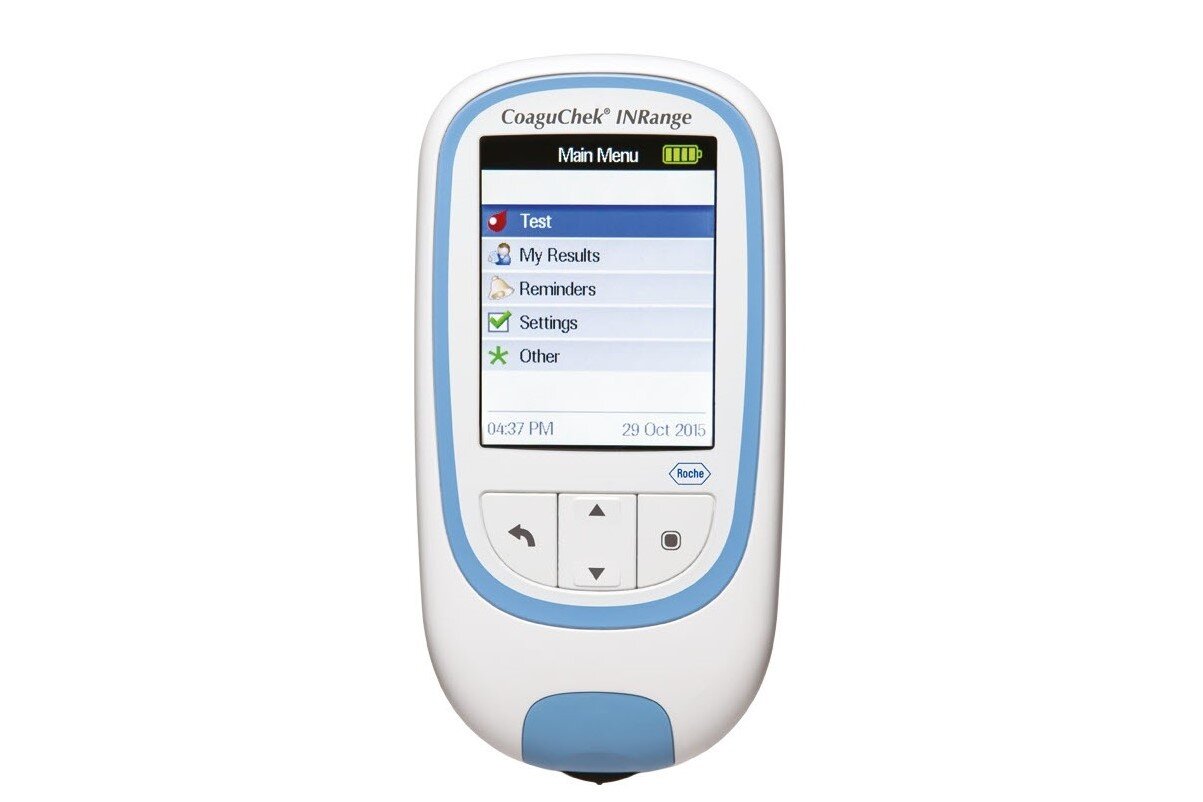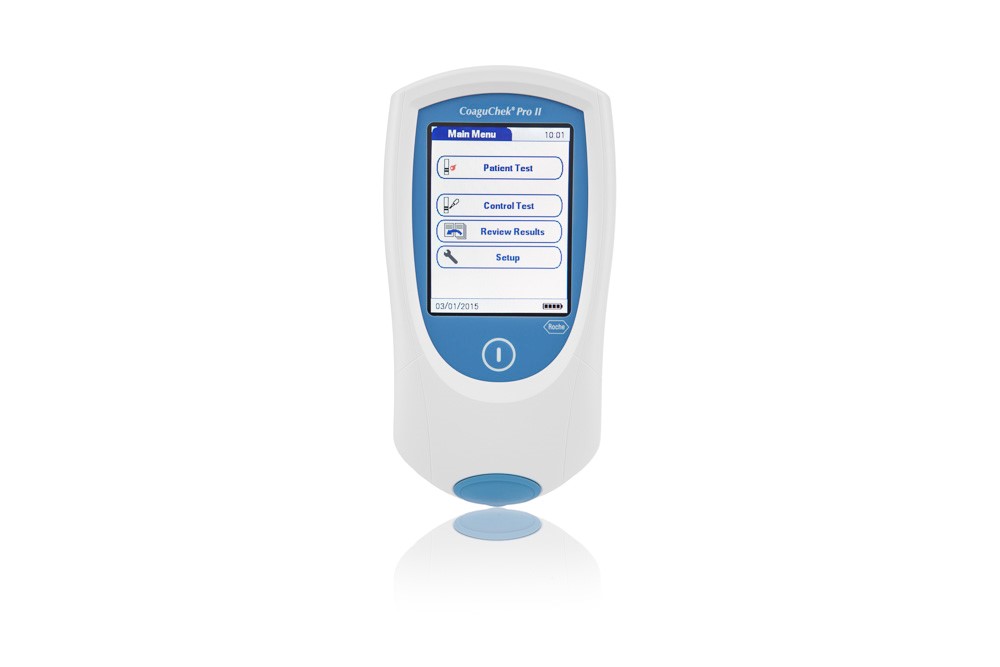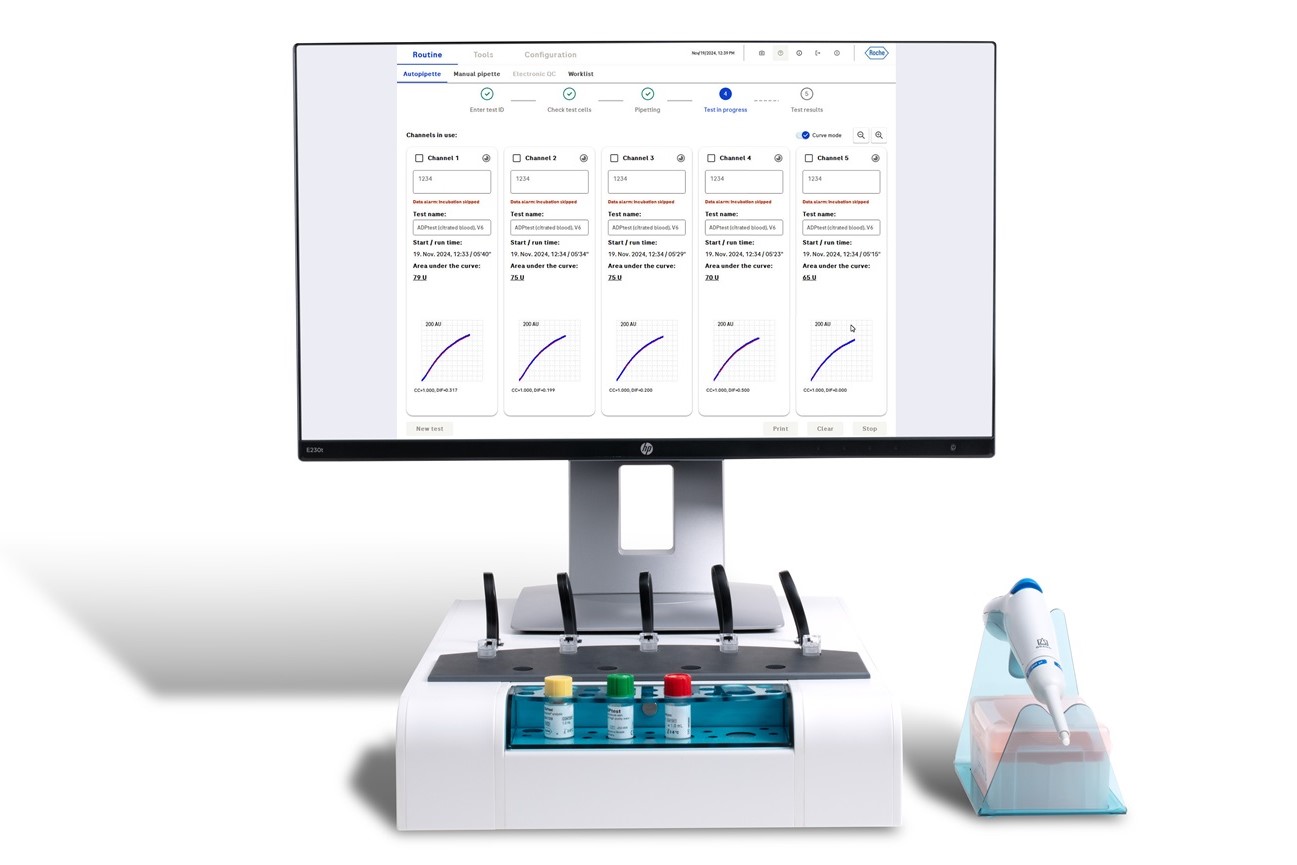Personalised anticoagulation care with haemostasis solutions from the hospital to the patients' home
We strive to equip you with the diagnostic options necessary for effective and reliable anticoagulation care. Our holistic coagulation testing solutions help you deliver personalised, dependable care for all your patients, while making the most of your valuable time.
Since 1992, Roche Diagnostics has been at the forefront of Point of Care blood testing, developing innovative solutions in coagulation monitoring and platelet function analysis that benefit both healthcare professionals and patients.
As a pioneer in Point of Care INR (International normalized ratio) monitoring, CoaguChek® has played a crucial role in improving anticoagulation therapy. It offers you a fast, reliable alternative to laboratory-based testing, allowing for quick INR determination from a simple finger prick sample1, which significantly enhances clinic workflow4-7 and treatment outcomes.2,3,8-10
For patients on long-term vitamin K antagonist (VKA) treatments like warfarin, CoaguChek® INR self-testing has been a game changer. It empowers your patients with better control, more time in the therapeutic range (TTR),11-13 and increased self-engagement.14,15 This not only improves patient satisfaction and quality of life,12,16,17 but also reduces overall treatment costs.1,18,19
For preoperative assessments and management of antiplatelet therapy, the Multiplate® Analyser is a trusted tool for platelet function testing. It provides essential insights to help diagnose platelet disorders and evaluate the effectiveness of antiplatelet medications, empowering you to make more informed treatment decisions and deliver personalised patient care.
Featured products
Benefits of Point of Care coagulation testing solutions from Roche
Encourage positive health outcomes and drive higher treatment satisfaction
- Boost patient satisfaction: Point of Care coagulation testing from capillary blood is fast, convenient, reliable, and most importantly, less painful than venous blood testing,20 allowing patients to monitor their INR levels more frequently and adjust their VKA dosage easily.11,21 Evidence shows that this solution can significantly improve overall treatment satisfaction22-24 and self-efficacy, while also reducing daily anxiety, distress and strain on the social network.1
- Elevate patient care: Compared with VKA patients who are tested in the laboratory or anticoagulation clinic, patients managed with Point of Care coagulation testing solutions spend more time within their target therapeutic range (TTR) and have fewer out-of-range readings.8-10 By maintaining a high TTR, your patient can benefit from fewer treatment-related complications, admissions to hospital and emergency department visits.4,25
- Empower patient self-management: Patient engagement has become a major focus of health reform, especially in managing chronic diseases.14 CoaguChek® patient self-testing (PST) empowers patients with confident self-management and motivates active involvement in their own healthcare compared to lab or office testing.28 This leads to improved therapy adherence and a better overall care experience.15,26,27
- Achieve better outcomes with rapid results: Using the Multiplate® Analyser to measure platelet function offers valuable insights into platelet disorders and the effectiveness of antiplatelet medications like acetylsalicylic acid (ASA), clopidogrel, prasugrel and ticagrelor. This information is essential for reducing bleeding risks during surgery, enabling timely surgical interventions and adjusting medications to balance thrombosis and bleeding risks.29-31
Empower confident therapy decisions at clinics, doctor's surgeries and at home
- Benefit from consistency in PT/INR results: CoaguChek® monitoring portfolio offers a single strip platform for consistency in PT/INR and aPPT results (prothrombin time/international normalized ratio and activated partial prothrombin time) across the continuum of care.32
- Trust in lab-comparable performance: Point of Care coagulation testing with CoaguChek® matches laboratory testing in precision,33-35 accuracy,35-38 and in guiding vitamin K antagonists (VKA) dosage decisions.35,38,39
Drive workflow efficiency and a new way of care
- Simplify your workflow: Point of Care coagulation testing can simplify anticoagulation management and improve workflow efficiency over usual care. Facilitate shorter clinic visits,5,24 reduce your workload,4,5 and encourage faster clinical decisions with immediate on-the-spot dose adjustments.4-7
- Make information available quickly: With the Multiplate® Analyser, you can eliminate time-consuming centrifugation and speed up testing and decision making using only small quantities of whole blood.40-41 This solution provides real-time insights into medicine efficacy, enabling quicker medicine adjustments and improving overall workflow efficiency.30,42
Unlock value in coagulation monitoring with cost-effective solutions for enhanced patient care
- Help reduce operational costs and drive revenue generation: Economic evaluations have shown that Point of Care coagulation testing is a cost-effective alternative to usual care — helping reduce clinic running costs,5,22 increase revenue generation in some settings,4 lower admission to hospital and emergency department visits,4,43 and potentially reduce cost for the overall healthcare system.1,19,44
- Offer cost-effective patient self-testing solutions you can trust: For long-term VKA patients, CoaguChek® self-monitoring has proven to be cost-saving. Particularly in highly motivated and properly trained patients, PSM (Patient self-management) significantly reduces treatment costs compared to usual care and anticoagulation clinics.1,18,19 This cost reduction is achieved by increasing the time spent in the target therapeutic range, thereby reducing the number of treatment complications.18,45

CoaguChek® training and support
CoaguChek Training and Support
Find out more about Roche’s world-class Coagulation Monitoring training and support programmes. There are various training options available to you and your patients, from in-person Training Centres and online eLearning options, all the way to phone support.

CoaguChek® firmware update
Firmware update
Update your CoaguChek INRange with the latest firmware. This article describes the firmware update process for the CoaguChek® INRange system with a USB cable.
References
- Medical Advisory Secretariat. Point-of-Care International Normalized Ratio (INR) Monitoring Devices for Patients on Long-term Oral Anticoagulation Therapy: an evidence-based analysis. . Ont Health Technol Assess Ser. 2009; 9(12)
- Jennings et al. Patient self-testing and self-management of oral anticoagulation with vitamin K antagonists: guidance from the British Committee for Standards in Haematology. Br J Haematol. 2014;167: 600-7
- Wan Y et al. Anticoagulation control and prediction of adverse events in patients with atrial fibrillation: a systematic review.Circ Cardiovasc Qual Outcomes. 2008;1: 84-91.
- Wurster et al. Anticoagulation Management: A New Approach. Dis Manag. 2006; 9, 201–209
- Fernholm et al. Introduction of point of care analysis for prescribing warfarin at a Swedish primary care centre. BMJ Qual Improv Rep. 2015; 4, pii: u208905.w3692
- Smith et al. Warfarin Management Using Point-of-Care Testing in a University-Based Internal Medicine Resident Clinic. Am J Med Sci. 2012; 344, 289–293
- Richter et al. Clinical Validation of R-T Estimation for CoaguChek XS INR Results. Ann Pharmacother. 2016; 50, 645–648
- Harrison et al. Anticoagulation management by community pharmacists in New Zealand: an evaluation of a collaborative model in primary care. Int J Pharm Pract. 2015; 23, 173-181
- Okuyama et al. Introduction of Point-of-Care Testing in Japanese Outpatient Clinics Is Associated With Improvement in Time in Therapeutic Range in Anticoagulant-Treated Patients. Circ J. 2014; 78, 1342–1348
- Mearns et al. Quality of vitamin K antagonist control and outcomes in atrial fibrillation patients: a meta-analysis and meta-regression. Thromb J. 2014; 12, 14
- Heneghan et al. Self-monitoring and self-management of oral anticoagulation. Cochrane Database Syst Rev 7. 2016; CD003839
- Soliman Hamad et al. Self-management program improves anticoagulation control and quality of life: a prospective randomized study. Eur J Cardiothorac Surg. 2009; 35, 265–269
- Siebenhofer et al. Self-management of oral anticoagulation in the elderly: Rationale, design, baselines and oral anticoagulation control after one year of follow-up.Thrombosis and Haemostasis.2007; Thromb Haemost 97, 408–416
- Greene et al. When Patient Activation Levels Change, Health Outcomes And Costs Change, Too.Health Aff. 2015; 34, 431–437
- Hibbard et al. How well do patient activation scores predict depression outcomes one year later? Med Care Res Rev.2015; 72, 324–337
- Tamayo Aguirre et al. Oral anticoagulation with vitamin K inhibitors and determinants of successful self-management in primary care. BMC Cardiovasc Disord. 2016; 16, 180
- Verret et al. Impact of a Pharmacist-Led Warfarin Self-Management Program on Quality of Life and Anticoagulation Control: A Randomized Trial. Pharmacotherapy. 2012; 32, 871–879
- Sharma et al. Is self-monitoring an effective option for people receiving long-term vitamin K antagonist therapy? A systematic review and economic evaluation. BMJ Open. 2015; 19, 1–172
- Gerkens et al. Economic evaluation of the use of point-of-care devices in patients with long term oral anticoagulation. J Thromb Thrombolysis. 2012; 34, 300–309
- Woods et al. Patient preferences for capillary vs. venous INR determination in an anticoagulation clinic: a randomized controlled trial. Thromb Res. 2004;114(3):161–5.
- Ward et al. Cohort study of Anticoagulation Self-Monitoring (CASM): a prospective study of its effectiveness in the community. Br J Gen Pract. 2015; 65(636):e428-437
- Chan et al. Management of Chinese patients on warfarin therapy in two models of anticoagulation service – a prospective randomized trial. Br J Clin Pharmacol. 2006; 62, 601–609
- Thompson et al. Evaluation of patient perceptions and outcomes related to anticoagulation point-of-care testing in ambulatory care clinics. Pharm Pract (Granada). 2009; 7, 213–217
- Kong et al. Feasibility, cost-effectiveness and patients’ acceptance of point-of-care INR testing in a hospital-based anticoagulation clinic. Ann Hematol. 2008; 87, 905–910
- Karlsson. A project to improve the management of patients on warfarin in a primary care setting through the introduction of a POC analysis. BMJ Qual Improv. 2016; Rep 5, pii:u211003.w4421
- Peterson et al. ACC/AHA/AACVPR/AAFP/ANA Concepts for Clinician–Patient Shared Accountability in Performance Measures. J Am Coll Cardiol. 2014; 64, 2133–2145
- Kääriäinen et al. Adherence with health regimens of patients on warfarin therapy.Journal of Clinical Nursing.2012; 22, 89–96
- Burgwinkle et al. Oral Anticoagulation Patient Self-Testing: Consensus Guidelines For Practical Implementation. Managed Care.2008; 17, 1–8
- Davidson S. Monitoring of antiplatelet therapy. Methods Mol Biol. 2023;2663:381-402.
- Sibbing D, et al. Updated expert consensus statement on platelet function and genetic testing for guiding P2Y12 receptor inhibitor treatment in percutaneous coronary intervention. JACC Cardiovasc Interv. 2019;12(16):1521-1537
- Sibbing D et al. Guided de-escalation of antiplatelet treatment in patients with acute coronary syndrome undergoing percutaneous coronary intervention (TROPICAL-ACS): a randomized, open-label, multicentre trial. Lancet. 2017;390(10104):1747-1757
- Fritzsche et al. Study Report: Performance evaluation and the user performance evaluation - Zenith/CoaguChek INRange, EU. Roche Professional Diagnostics Operation. 2015
- Bonar et al. International Normalized Ratio Monitoring of Vitamin K Antagonist Therapy: Comparative Performance of Point-of-Care and Laboratory-Derived Testing. Semin Thromb Hemost. 2015; 41, 279–286
- Plesch et al. Results of the performance verification of the CoaguChek XS system. Thromb Res. 2008; 123, 381–389
- Christensen et al. Precision and accuracy of point-of-care testing coagulometers used for self-testing and self-management of oral anticoagulation therapy. J Thromb Haemost. 2012; 10, 251–60
- Meneghelo et al. Comparison of the international normalized ratio levels obtained by portable coagulometer and laboratory in a clinic specializing in oral anticoagulation. Int J Lab Hematol. 2015; 37, 536–543
- Plesch et al. Validation of the international normalized ratio (INR) in a new point‐of‐care system designed for home monitoring of oral anticoagulation therapy. Int J Lab Hematol . 2009; 31, 20–25
- Dillinger et al. Accuracy of point of care coagulometers compared to reference laboratory measurements in patients on oral anticoagulation therapy. Thromb Res. 2016; 140, 66–72
- Colella et al. Performance of a point-of-care device in determining prothrombin time in an anticoagulation clinic. Blood Coagul Fibrinolysis. 2012; 23, 172–174
- Multiplate® analyser User Guide Version 6.0
- MP5 SW version 2.07 Quick Reference Guide 5.0
- Geisler T et al. High Platelet Reactivity in Patients with Acute Coronary Syndromes UndergoingPercutaneous Coronary Intervention: Randomized Controlled Trial Comparing Prasugrel and Clopidogrel. PLoS One. 2015;10(8):e0135037.
- Rudd et al. Comparison of two different models of anticoagulation management services with usual medical care. Pharmacotherapy. 2010; 30, 330–338
- Claes et al.Estimating the cost-effectiveness of quality-improving interventions in oral anticoagulation management within general practice. Value in Health. 2006; 9, 369–376
- Bloomfield et al. Meta-analysis: effect of patient self-testing and self-management of long-term anticoagulation on major clinical outcomes.Ann Intern Med.2011;154, 472–482



